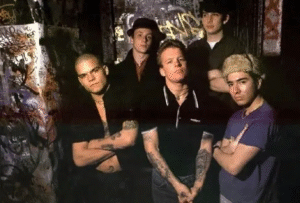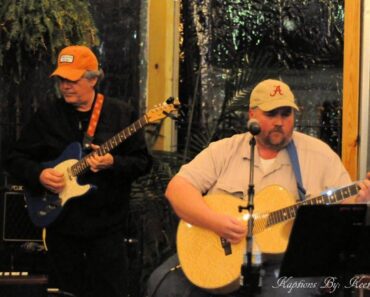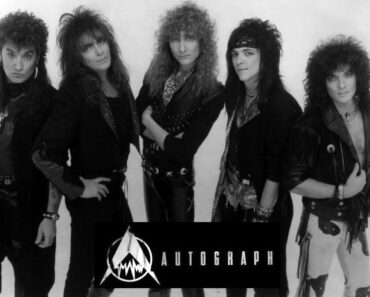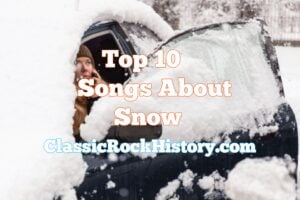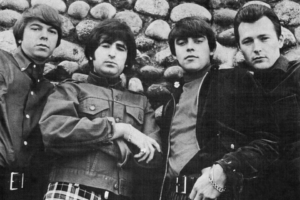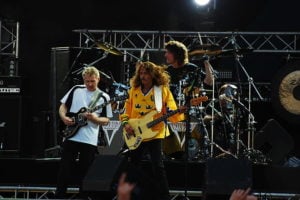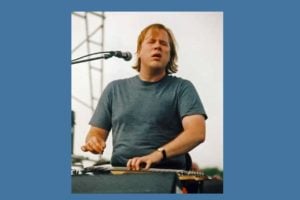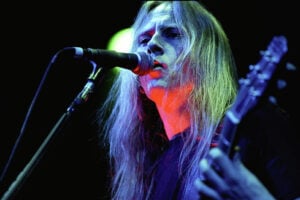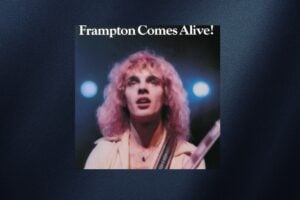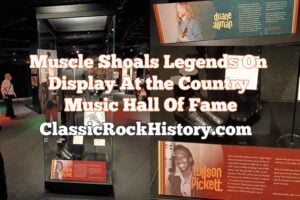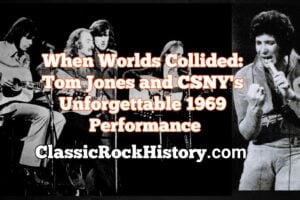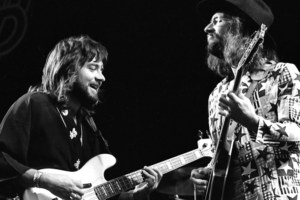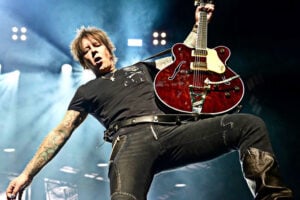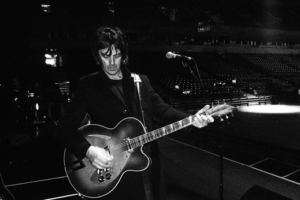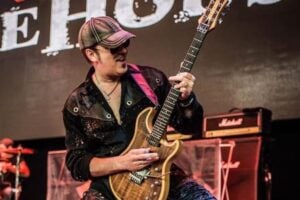If you lived in New York City in the ‘80s, you probably remember the musical phenomenon that was hardcore music. It was a time when The City was filled with grit, danger, and darkness, and hardcore music became the perfect soundtrack for that.
Amongst the chaos, one band rose from the seedy underbelly of The City above the rest. That band was the Cro-Mags, which featured John Joseph on vocals, Harley Flanagan on bass, Parris Mayhew on guitar, Mackie Jayson on drums, and Doug Holland on second guitar.
Looking back on what that music meant to him, Holland tells ClassicRockHistory.com: “To me, it was the real rock ‘n’ roll. The underground rock scene was just perfect for my age to learn more and create as I was doing what I was doing all along.”
To that end, Cro-Mags’ debut record, 1986’s The Age of Quarrel, is one for the ages. It blended the hybrid nature of hardcore with the inherent danger of New York City, creating a living, breathing document that has stood the test of time.
As for Holland, he weaved his way in and out of Cro-Mags, finally departing for good in 2001. As of today, Harley Flanagan is the only original Cro-Mag left, a fact that Holland believes will never change.
Fans still hope for a reunion, but Holland insists that they shouldn’t look back in anger and instead appreciate the band for what it was. “For the Cro-Mags fans who were there back in the day,” Holland says. “They will remember how great it really was.”
“For the new fans,” he continues. “Remember: those grooves came from the tracks of your vinyl recordings. Accept no phony Beatlemanias by one guy who hires and fires hired guns.”
What Led You to the guitar?
I was one of the lucky kids who caught The Ed Sullivan Show featuring The Beatles before I turned five. At that young age, I didn’t know what I wanted to be, but I had a premonition; I felt drawn to the glittering allure of music.
Growing up in a middle-class family with no strong interest in music made it challenging for me to get a guitar at five years old. I was often told it wasn’t a toy; it was expensive, and lessons were even more costly, which my family couldn’t afford. Despite this, I continued to ask for one.
My dad worked every day in New York City as a vending machine mechanic. Eventually, he came across a 1957 Sears Silvertone acoustic guitar in a pawn shop in Hell‘s Kitchen and brought it home for me. With no formal direction, I had to figure out my way to play. Lessons were out of the question, so I was determined to teach myself.
I started tuning the strings to my tunings, which might have been some form of open chord. To this day, I can’t say for sure what I was doing, but I could follow the structure of notes, and that’s all that mattered to me. I could pick up a jingle after hearing just the first three notes.
Watching morning cartoons and commercials was a way for me to learn how to play the guitar at the age of five. This helped me understand note keys and develop my fingers in the process. I would play around like this, along with Beatles records and the sounds of the ’60s and early ’70s.
By age eight, my relationship with the guitar felt natural. It was time to learn how to tune it properly and understand the names of the strings and chords. Since lessons were still too expensive for my family, my aunt’s boyfriend taught me some barre chords, a few open chords, and how to tune the guitar. That was the beginning of my proper musical journey.
How did the NYC scene around you growing up impact you?
At 14 years old, my first band, Apprehended, would take me to the hot nightspots of rock and punk, driving around NYC. Max’s Kansas City, CBGB. Club 57, Mud Club, and a slew of loft parties. The guys in the band were older than I by a few years, and I dressed like them, making me fit in.
So, it wasn’t hard for me to get into any of the venues, clubs, or parties at my age. It was then that I knew I could play this type of music. It wasn’t just the overproduction of major recording conglomerate record labels that created the bands at that time were doing.
What gear did you use when you were starting out as a young guitar player?
Of course, my beloved 1957 Sears Silvertone acoustic, which I got at five, that I still own, would be joined by an early 60s Italian one that was nice, as well as a Japanese plank copy that I had years later, which my dad demolished. “Stay in school, get good grades, kids. “
I guess this horrific mess had a change of heart and bought myself my first 1974 Gibson cherry Deluxe [Gibson] SG, a beautiful guitar, which was unfortunately stolen. In 1976, I got my new Gibson Tobacco Custom Les Paul. That would be the guitar that became comfortable with me. I was able to meld with it, then say the others. I’ve always said that guitars are like women, they’re all different.
As for my amps, as a kid, I used to plug into old radio transistors. If I got a signal, I used it. My first amp was one of those 20-watt, one-speaker Uni Vox, which seemed like every kid on the block owned, too. I didn’t own that for too long, as I blew that thing up.
I moved on up at 14 years old, and I got myself an OR 120 made in England. It was an early 70s, Orange head original that I made black. So, I got an all-black Orange cabinet with four 12 “ Greenback Celestions in it—a fascinating amplifier. I was very fortunate to get such a great amplifier like that at my age.
Is that the gear you used once you got rolling as a recording artist?
I recorded with the OR120 Orange with Orange cabinet for all the Kraut recordings, as well as being on the road. For what it went through, it’s still in amazing condition. For Cro-Mags, I had no choice but to go with Marshall JCM 800s.
I definitely was not disappointed. Think of how many years of inventions and ideas have come out and different applications. I must’ve gone through so far in my life. So, I keep it simple: distortion/overdrive could be a Proco Rat, could be an [EHX] Big Muff, all depending on how I was feeling that day.
When it comes to recording, I’ve come to the realization that I didn’t need all those power amplifiers that I was using. I’m glad that I did, and they’re definitely out on the grooves of the vinyl, but I realized a lot of little tube amplifiers could mimic the sound of giant amplifiers in the right studio.
You mentioned Kraut. What’s the story behind that band?
Kraut was the ingenuity of my first band apprehended that I had previously left in 1979. I came up with the name of the band and literally got the guys together. As young as we were, Johnny Feedback, a drummer, I was the most proficient as a musician.
We had an incredible break: our first gig, opening up for The Clash at Bonds in New York City on June 11, 1981. It would be our first-ever show. Then, a month before that, a year later, we opened up for the professionals, featuring ex-Sex Pistols Steve Jones and Paul Cook.
They became quite fond of the band, and Steve Jones volunteered to play on three guitar tracks off our first LP, An Adjustment to Society. But Kraut, as a band, was interesting to say the least. Being the general of the outfit, I had to always come up with the music, and then I had to work amongst the others to get my point across.
Lyrics-wise, at some point, we all started chipping in. It was like a free-for-all. I normally start the song off; each person would throw in a line or two. It was hilarious, sometimes confusing, but that’s what it was. For the most part, it worked.
During the writing and recording of Krauts’ follow-up to An Adjustment to Society, Whetting the Scythe, I was pleased with the prestige and praise it received. We had a really good tour, but I can’t say I’m 100% happy about that record. All I know is I worked hard, and I expected more, and I felt I got less. I guess that’s part of growing as an artist, or maybe I felt I needed to expand.
How did you first meet Harley Flanagan and John Joseph?
At the time, before Cro-Mags, John Joseph and Harley Flanagan constantly knocked on my apt door of the Lower East Side of Manhattan during the morning hours, asking if I had a morning spliff that I would kindly light up with them. Of course, I always invited them in, as they were always a menace of laughs.
Then it came to a discussion: “Hey! How come we don’t start a band together, all three of us? We’ll get Nunzio from Antidote to play bass.” Through the haze of smoke, we all laughed, and I said, “Why don’t we? We can play at my club A7, which I manage. I have the keys during the day, and we can go in there and rehearse?”
That’s all I had to say. The A7 was equipped with amplifiers and a PA, all going through a soundboard and monitors, all connected. And there were two microphones hanging from the ceiling, going to a DJ booth that had a stereo recording cassette machine. All the songs written are documented. The whole PA and recording system was connected to one switch.
What were the early days like for you three?
It was John Joseph on vocals, Harley Flanagan on drums, Rob Nunzio on bass, and me on guitars. Normally, I would go into some heavy guitar riffs with Harley bashing, playing along after a certain number of bars. We’d go back and listen to the recording, and John would listen back and write lyrics to what we had just finished recording and writing at the same time.
But here I was, on the verge of getting caught and losing my job over doing this. It just wasn’t serious as a full-time gig, but it was a lot of fun. I would take pieces of other songs already written and Frankenstein them into something else while Harley bashed the drums, and that’s how the songs came out.
I would borrow a riff from, say, “I Don’t Wanna Hear It” by Minor Threat, and add it into the repertoire of the songs that were being written. How did I know that Harley was going to end up taking that and bringing it to Cro-Mags, not even knowing that the song came from Minor Threat? So, I would come up with the riffs, and John would write the lyrics. And the name of that early band was called Mode of Ignorance, or short for M.O.I.
What led to your departure from Kraut and the official launch of Cro-Mags?
After my tour of California for my second Kraut record, and losing a lot of money, since everything came out of our pockets, I came home to nothing. Of course, I was behind in the rent. Good thing I still had the A7 Club to come home to, and any other businesses I needed to tend to.
The word was that Christopher Williamson of Rock Hotel Bookings wanted to manage Kraut, but the team didn’t wanna give up any of the percentage they felt that they earned by getting us as far as we did at that time. It was just by hard work, and we barely had money. We were doing the DIY thing, and all I remember was broke at the end of the month.
So, after coming back from California, Harley came to my apartment to play me the demo tape that was just mastered finished. This was one of the copies, and Parris had sent the masters to his father in Texas to be remastered and turned out.
The machine Keven’s dad had was not in sync with the machine they recorded on, so the speeds were different than the one his father had in Texas, so he had it mastered at the faster speed anyway. The demo tape is actually faster than the original recording if you listen to it. John Joseph sounds like Mickey Mouse on that demo tape. Now that I’ve told you that info, you will never be able to hear it the same way again. [Laughs]
What were your thoughts on the demo?
I told Harley, “I hear the essence of MOI in this demo.” That’s when he said he needed my style. He said, “I want you. If you join, we are guaranteed a Profile Records recording deal.” I did know my guitar playing, along with that energy, would go over big.
So, I gave Kraut my resignation from the band that I started to the remaining members with my blessings to get another guitar player to use the name of my band and my songs, and wished them well. Unfortunately, the guitar player they replaced me with tragically passed away, and that was the end of the band at that time.
Parris is often credited with a lot of the leads in Cro-Mags, but what did you bring to the band in terms of riffs, texture, and sound?
Most of his riffs were already written from the demo, except for two songs, “Seekers of the Truth,” where I crunched the rhythm part while Parris played the riff. That gave the song great dynamics. And “We Gotta Know” was also new.
The intro was so kick ass that our manager suggested we extended it, so we did. I crunched the hell out of that one and shared the lead duty on the second half. In terms of lead, that was another reason I was hired. I did all the lead work on “Best Wishes,” plus my crunching rhythms.
I co-wrote three of the songs, “Death Camps,” Down but Not Out,” and “Crush the Demoniac.” And on “Best Wishes,” John Joseph didn’t make it on. I, too, was almost left out. Let’s just say that it was imperative that I was to be on that record.
What are your earliest memories of the writing sessions for the Age of Quarrel?
Most of that album was already written. I knew what had to be done sound-wise. My Les Paul, and Parris’s B.C. Rich guitar made for an extraordinary album.
Why did the band/label choose Christopher Williamson as producer?
Initially, I thought we were just being taken by Profile Records. Profile set up a subsidiary with Chris to have him set up an offshoot label called Rock Hotel Records. Not one of the greatest ideas. Chris knew the heavy sound he wanted. I worked well with Chris. He knew my crunch, and we made it happen.
What gear did you bring with you into the studio?
As guitarists, we both used Marshall’s JCM 800 series. I used my ‘76 Gibson Custom tobacco sunburst Les Paul. My go-to guitar for everything. For distortion and overdrive, I used my Proco Rat and my [EHX] Big Muff.
I ended up mostly using the Rat. And I like a little reverb in the background, so I used my Fender Reverb unit, a Boss Digital Delay, and my Jimi Hendrix Cry Baby wah-wah pedal. That’s about what I brought to the table.
What was Eastside Studios like, and how would you describe your approach as a guitarist as it pertained to the tracks?
Before Eastside, I worked in the Chrysler Building, Saatchi & Saatchi advertising. In the rooms, they did the overdubs for the Underdog cartoon. I was working with 24-track Ampeg machines, identical to the ones that The Beatles used, except they ran both machines off one motor. We had to bounce one track to one machine and then to another, losing a lot in the process. It was nice to work with a full 24-track console and experience state-of-the-art amenities for the first time.
You were the primary guitarist in Kraut but shared space with Parris in Cro-Mags. Did you feel underused or undervalued?
Not at all. I believe I brought in what was too be needed to make the band roar, and be melodically hard.
Did you choose different gear from Parris to create separation?
The only difference in my setup was using Marshall JCM 800 series amps. I knew the effects I was using because I’ve used them all before. And I knew ahead of time what I was going to get out of them.
Some of the Cro-Mags’ members were notoriously difficult, rowdy, and loved to party. Did that create tension?
Each member of that band had their quirks, including me. That made it work… for a while. Otherwise, it wouldn’t have been what it was.
The first time you listened back to The Age of Quarrel, what were your thoughts? Did you sense that you’d made a special record?
Of course. I would get together with Chris Williamson every other day to listen to playback tapes. But the overdubs that were made didn’t have that punch as they did in the studio. Chris spent hours trying to figure out why it sounded so good there, and then, when we played it on outside equipment, it didn’t have that punch.
After many mixes, we realized something was out of phase. After many attempts, Steve, the remote engineer, and Chris Williamson, the producer, finally got it together, and we were all happy with the result. In the process of recording age, I knew we were onto something that no one else was, and I knew it was the groundwork for bands to come later.
How would you describe your relationship with Parris as far as guitars go? Did you write more than credited for?
I feel Parris and I would work well together. After all, two guitars sounded better than one. As for writing, I started to realize that the riffs I would come up with during rehearsals, Harley would take them, add to them, and then claim he wrote them.
I caught on to this and would fix him by taking a riff from Iron Maiden, and, sure enough, he took it and added to it, claiming he was the one who wrote it. I laughed too myself saying one day, “People will know where that riff came from…” Neither Harley nor Parris knew what I’d done ‘til years later. [Laughs]
Cro-Mags carried on intermittently through the years but weren’t totally consistent. Why was that, and do you feel you left anything on the table?
I think the work I’ve done on the four albums speaks for itself. As for the inconsistencies, the mirror is the image of personalities. When that changes, so does the music.
Why aren’t you playing with Cro-Mags now, and is there a chance you will in the future?
Actually, I left the band after each record, and for some reason, I was lured back. I highly doubt that the original band will ever get back together. It’s a franchise now, and that one person [Harley Flanagan] will never let that go.
Are you still playing guitar regularly, and what’s next for you?
I still play regularly. And I write and record privately in my own studio. I’ve been working on my memoirs, taking my time.
Read More: Artists’ Interviews Directory At ClassicRockHistory.com
Read More: Classic Rock Bands List And Directory

